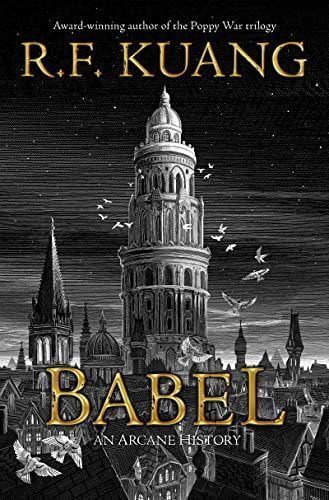
Babel Or the Necessity of Violence: An Arcane History of The Oxford Translators' Revolution
Traduttore, traditore: An act of translation is always an act of betrayal.
1828. Robin Swift, orphaned by cholera in Canton, is brought to London by the mysterious Professor Lovell. There, he trains for years in Latin, Ancient Greek, and Chinese, all in preparation for the day he’ll enroll in Oxford University’s prestigious Royal Institute of Translation — also known as Babel.
Babel is the world’s center of translation and, more importantly, of silver-working: the art of manifesting the meaning lost in translation through enchanted silver bars, to magical effect. Silver-working has made the British Empire unparalleled in power, and Babel’s research in foreign languages serves the Empire’s quest to colonize everything it encounters.
Oxford, the city of dreaming spires, is a fairytale for Robin; a utopia dedicated to the pursuit of knowledge. But knowledge serves power, and for Robin, a Chinese boy raised in Britain, serving Babel inevitably means betraying his motherland. As his studies progress Robin finds himself caught between Babel and the shadowy Hermes Society, an organization dedicated to sabotaging the silver-working that supports imperial expansion. When Britain pursues an unjust war with China over silver and opium, Robin must decide: Can powerful institutions be changed from within, or does revolution always require violence? What is he willing to sacrifice to bring Babel down?
Babel — a thematic response to The Secret History and a tonal response to Jonathan Strange & Mr. Norrell — grapples with student revolutions, colonial resistance, and the use of translation as a tool of empire.
Reviews
tofuniculus@tofhu
joey@jnfuur
Cristian Garcia@cristian
kay@pecanpages
shadee@shadeeqa
Tari Rosario@documentari
micki@micki
Liv Wukasch@liv-wukasch
Ashley Denktas@foxface
Sunkist’s Darling@dustsoleil
Usman Merchant@uszy
Seka.@odysse
Ky@krisnsky
angel@snoopysscarf
sujj@sxrxt
asher@cvelprinces
Julieta@julibagli
Chase Leitner@chase_leitner21
annaaa@milkcroissants
Anastasiia @anasviripa
Poorva @po0rva
Karmen @karmentorralba
wen@orchidsboat
Treyden Talbot@treyden
Highlights
kay@pecanpages
Page 344
kay@pecanpages
kay@pecanpages
Page 87
kay@pecanpages
Page 51
kay@pecanpages
Page 27
kay@pecanpages
Page 30
Liv Wukasch@liv-wukasch
nice@yg2hj
Page 404
nice@yg2hj
Page 258
Sara Salem@sjsalem
Page 384
Sara Salem@sjsalem
Page 311
nice@yg2hj
Page 137
Sara Salem@sjsalem
Page 164
nice@yg2hj
Page 60
nice@yg2hj
Page 19
sujj@sxrxt
sujj@sxrxt
Page 397
sujj@sxrxt
Page 389
sujj@sxrxt
Page 177
sujj@sxrxt
Page 100
sujj@sxrxt
Page 31
bri 🍂@bristiel
Page 351
mionne@heartcarving
mionne@heartcarving